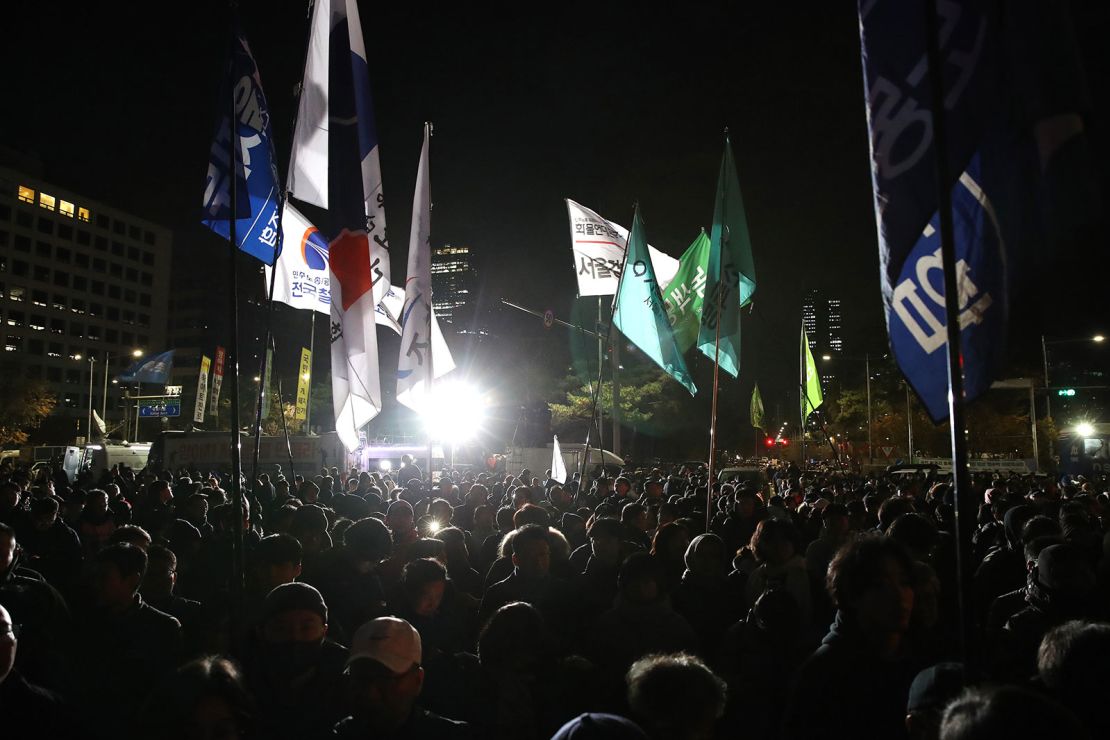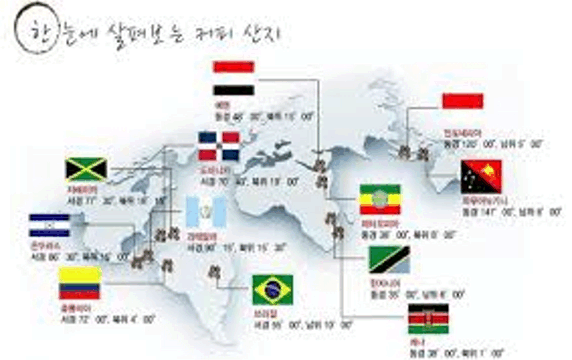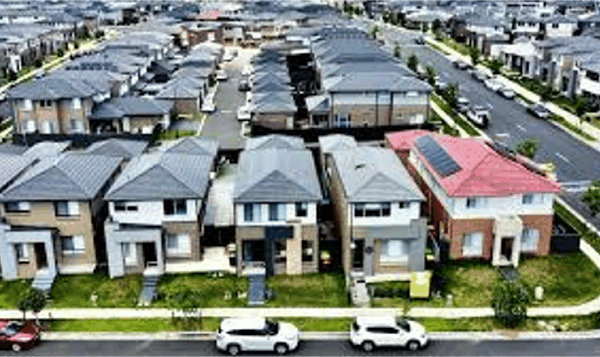서울, 한국 CNN —
한국은 6시간 동안의 혼란스러운 상황으로 인해 휘청거리고 있습니다. 이 기간 동안 곤경에 처한 대통령은 계엄령을 선포했지만 광범위한 비난 속에서 계엄령을 해제해야 했고, 이로 인해 국가의 정치적 지형이 혼란과 불확실성에 빠졌습니다.
이 사연은 화요일 밤 대부분의 한국인이 잠자리에 들 준비를 하면서 시작되었습니다. 분노한 의원들은 군인들을 지나쳐 의회로 들어가 계엄령을 무효화하려고 했고, 시위대는 윤석열 대통령을 해임하고 고통스러운 권위주의 과거로 돌아가지 말 것을 요구했습니다.
새벽이 되자 대통령은 굴복하여 계엄령을 해제하기로 동의했습니다. 하지만 전문가들은 그가 정치적 무덤을 파고 있다고 말합니다. 야당은 그를 탄핵하려 하고, 경찰은 그를 반역죄로 수사하고 있으며, 그의 소속 정당은 그를 축출하려 하고 있습니다.
윤 대통령의 대통령 임기, 그의 정당의 통치, 그리고 세계에서 가장 중요한 경제권 중 하나이자 미국의 주요 동맹국에서 앞으로 무슨 일이 일어날지에 대한 의문이 여전히 맴돌고 있습니다.
우리가 알고 있는 것은 다음과 같습니다.
무슨 일이 일어났을까요? 계엄령이란 무엇일까요?
윤은 화요일 현지 시간 오후 10시 30분경에 사전 예고 없이 심야 TV 연설을 통해 계엄령을 선포하면서, 국가의 주요 야당이 북한에 동조하고 “반국가적” 활동을 한다고 비난했습니다.
광고 피드백
그는 또한 의회에서 다수당을 차지하고 있는 야당 민주당이 검찰총장을 탄핵하고 정부 예산안을 거부하자는 동의안을 인용했습니다.
계엄령은 대통령이 헌법상 선포할 수 있는 비상사태 동안 군에 임시 통치권을 부여하는 것을 말합니다. 하지만 이 발표는 폭탄처럼 터져 민주주의 국가에 충격파를 퍼뜨리고 심야에 놀라운 정치적 대결을 촉발했습니다.
연합뉴스에 따르면, 강력한 현대적 자유 언론 전통을 가진 국가에서 윤의 군사령은 시위, 집회, 정당의 행동을 포함한 모든 정치 활동을 금지했습니다. 또한 “자유 민주주의를 거부하거나 전복 시도”와 “여론 조작”도 금지했습니다.
결국 이 령은 몇 시간 동안만 지속되었습니다.
윤석열 대통령이 계엄령을 선포한 후, 12월 4일 이른 아침, 한국 서울에서 사람들이 국회 앞에 모였습니다. Chung Sung-Jun/Getty Images
의원들은 건물을 봉쇄하기 위해 배치된 군인들을 밀치고 국회로 몰려들었습니다.
심야에 열린 비상 회의에서 참석자들은 만장일치로 령을 차단하기로 투표했으며, 대통령은 법적으로 이 투표를 따라야 합니다.
윤의 법령에 반대하기 위해 국가의 정치 블록이 모였습니다. 여기에는 윤의 소속 정당 구성원도 포함되었고, 당 대표는 국민에게 사과하고 대통령에게 설명을 요구했습니다.
오전 4시 30분까지 윤은 계엄령을 준수하고 해제하겠다고 발표하면서, 전날 밤에 배치된 군대를 철수했다고 말했습니다. 하지만 그는 야당이 그의 정부의 움직임을 좌절시키고 있다는 비난을 두 배로 늘리며, 의원들에게 “입법 조작”을 중단하라고 촉구했습니다.
윤의 내각은 곧 법령을 해제하기로 투표했습니다. 대통령은 그 이후로 공개 성명을 내지 않았습니다.
정치적 마비
한국은 수개월 동안 극심한 정치적 교착 상태에 빠져 있었으며, 4월에 자유주의 야당이 의회 다수당을 차지했습니다. 이번 선거는 윤에 대한 국민투표로 널리 여겨졌는데, 윤의 인기는 2022년 취임 이후 여러 스캔들과 논란으로 인해 급락했습니다.
보수주의자인 윤은 입법이 필요한 많은 정책에서 야당과 충돌하여 세금을 인하하고 기업 규제를 완화하겠다는 공약을 이행하지 못했습니다.
또한 그는 야당이 정부 인사들을 탄핵하려는 시도에 점점 더 좌절감을 느꼈습니다. 그는 방송감시위원장, 국가감사원장, 여러 고위 검찰총장을 임명했습니다. 연합뉴스에 따르면
특히 검찰은 윤에게 민감한 문제입니다. 야당 의원들은 윤의 부인이자 영부인을 기소하지 못했다고 주장합니다. 그녀는 스캔들과 주식 조작 혐의에 연루되었지만 대통령실은 이를 거듭 부인했습니다.
반응은 어땠을까요?
이 법령이 발표된 직후 전국과 전 세계에 분노와 충격, 혼란이 퍼졌습니다.
시위대는 국회 건물 밖에 모여 윤석열 탄핵과 계엄령 종식을 요구했고, 의원들은 부지에 배치된 약 300명의 군인을 제치고 안으로 들어갔습니다.
윤석열이 계엄령을 해제한 후에도 시위는 계속되었고 주말에는 규모가 더 커질 것으로 예상되며, 모든 시선은 이제 임박한 탄핵 절차에 쏠려 있습니다.
“윤석열의 불법 계엄령을 규탄합니다”라고 쓰인 현수막을 든 남한 시위대
12월 4일 서울 광화문 광장에서 열린 집회. 정연제/AFP/게티 이미지
미국에 미치는 영향은?
미국은 윤 총장이 계엄령을 선포한 후 “심각한 우려”를 표명했고, 그가 계엄령을 해제한 후 안도감을 표시했습니다. 그는 민주주의가 미-한 동맹의 핵심이라고 말했습니다.
두 나라는 수십 년 된 상호 방위 조약을 맺고 있으며, 이는 두 나라가 공격을 받을 경우 서로를 도와야 한다는 것을 의미합니다.
주요 미군 시설(해외 최대 규모의 미군 기지인 캠프 험프리스 포함)에 주둔한 미군은 약 3만 명에 달합니다.
미국과 상호 방위 조약을 맺은 일본과 필리핀과 함께 한국은 수십 년 동안 아시아와 태평양에서 미국의 힘을 강화하는 데 도움을 준 3개 지역 파트너 중 하나입니다.
지지자들은 김정은 정권이 핵무기를 계속 구축함에 따라 북한의 잠재적 공격을 억제하고 중국의 침략에 대응하기 위해 이 지역에서 미군의 존재감을 강화하는 방법으로 한반도에 상당한 미군이 주둔하는 것이 중요하다고 주장합니다.
북한은 또한 모스크바 군대를 지원하기 위해 군대를 파견하여 러시아의 우크라이나 침공에서 핵심 역할을 했으며, 고립된 아시아 강대국을 제2차 세계 대전 이후 유럽에서 가장 큰 갈등에 끌어들였습니다.
이제 무슨 일이 일어나고 있습니까?
시위대와 야당 인사들이 그의 해임을 요구하면서 윤의 미래는 불확실하며, 그의 당 내에서도 동맹이 거의 남지 않았습니다.
한국의 국가 경찰은 윤과 다른 고위 관리들을 반역 혐의로 수사하고 있습니다. 한편, 이의 민주당은 윤과 다른 관리들을 반란 혐의로 기소했다고 밝혔습니다.
야당은 의회에 탄핵 조치를 도입했으며, 의회는 이르면 토요일에 이 문제에 대해 투표할 수 있습니다. 3분의 2 이상의 찬성을 얻어 통과되면, 이후 추가 승인을 위해 국가 최고 법원 중 한 곳으로 가게 됩니다.
하지만 윤의 집권 여당인 국민의힘은 탄핵이 국민 사이에 혼란을 일으킬 것이라고 말하면서 이를 차단하기 위해 노력하고 있습니다. 하지만 그는 대통령의 “위헌적인 계엄령”을 비판했습니다. 대신 그는 윤이 당을 완전히 탈퇴할 것을 요구하고 있습니다.
전 국방부 장관과 윤의 수석 보좌관을 포함한 여러 정부 인사가 사임했고, 군부 내 고위 인사들은 계엄령과 거리를 두거나 자신들이 이를 알지 못했다고 밝혔습니다.
한국 최대의 산하 노조도 수요일에 윤이 사임할 때까지 회원들이 무기한 총파업에 돌입할 것이라고 밝혔습니다.
분석가는 한국 대통령이 ‘큰 정치적 실수’ 중 하나를 저질렀다고 말합니다.
이것은 한국에서 드문 일일까요?
그렇습니다. 특히 수십 년간의 권위주의 통치 이후 민주주의를 향한 길고 고통스러운 여정을 감안할 때 더욱 그렇습니다.
한국은 1980년대부터 정기적인 시위, 자유로운 언론, 공정한 선거, 평화로운 권력 이양을 통해 활기찬 민주주의 국가가 되었습니다. 국내 정치 현장은 오랫동안 불화가 심했으며, 정치적 분열의 양측에 있는 대통령은 종종 재임 중이든 퇴임 중이든 기소를 당했습니다.
계엄령은 현대 민주주의 시대에는 전례가 없는 일로, 한국은 K팝과 K드라마의 엄청난 세계적 인기 덕분에 주요 수출국이자 문화 강국이 되었습니다.
하지만 한국은 어두운 정치적 과거를 가지고 있습니다. 냉전의 대부분 기간 동안 한국은 여러 차례 계엄령을 선포한 강력한 지도자와 군부 통치자를 거쳤습니다. 때로는 대중의 불만이 커지는 가운데 권력을 유지하기 위해 계엄령을 선포하기도 했습니다.
당시 시위는 쉽게 치명적일 수 있었고, 군대가 반발하는 사람들을 진압하기 위해 배치되었습니다.
마지막으로 한국 대통령이 계엄령을 선포한 것은 1980년으로, 학생과 노동 조합이 주도한 전국적 봉기 때였습니다. 한국이 자유롭고 직접 선거를 통해 대통령을 선출한 것은 1988년이 되어서였다.
그래서 시위대는 화요일과 수요일에 플래카드를 들고 구호를 외치며 독재 통치로 다시 돌아가지 않겠다고 맹세했고, 그 기억은 많은 사람들의 기억 속에 생생하게 남아 있다.
What has happened in South Korea and what does martial law have to do with it?
Seoul, South KoreaCNN —
South Korea is reeling after a whiplash six hours during which the country’s embattled president declared martial law but was forced to lift it amid widespread condemnation, throwing the country’s political landscape into chaos and uncertainty.
The saga began unfolding Tuesday night as most South Koreans prepared to go to sleep – prompting furious lawmakers to force their way past soldiers into parliament to strike down the decree, as protesters demanded President Yoon Suk Yeol’s removal and no return to the country’s painful authoritarian past.
By dawn, the president had caved – agreeing to lift martial law. But experts say he’s dug a political grave; opposition parties are trying to impeach him, police are investigating him for treason, and his own party is trying to oust him.
Questions are still swirling around the future of Yoon’s presidency, his party’s rule, and what happens next in one of the world’s most important economies and a major United States ally.
Here’s what we know.
What happened? What is martial law?
Yoon declared martial law around 10:30 p.m. local time Tuesday in an unannounced late-night TV address, accusing the country’s main opposition party of sympathizing with North Korea and of “anti-state” activities.
Ad Feedback
He also cited a motion by the opposition Democratic Party, which has a majority in parliament, to impeach top prosecutors and reject a government budget proposal.
Martial law refers to granting the military temporary rule during an emergency, which the president has the constitutional ability to declare. But the announcement hit like a bombshell, sending shock waves through a democratic nation and sparking an astonishing late-night political showdown.
In a nation with a strong contemporary tradition of free speech, Yoon’s military decree banned all political activities, including protests, rallies, and actions by political parties, according to Yonhap news agency. It also prohibited “denying free democracy or attempting a subversion,” and “manipulating public opinion.”
In the end, the decree only lasted a few hours.

People gathered in front of the National Assembly in the early hours of December 4 in Seoul, South Korea, after President Yoon Suk Yeol declared martial law. Chung Sung-Jun/Getty Images
Lawmakers flocked to the parliament, pushing their way past soldiers who had been deployed to keep the building blocked off.
In an extraordinary emergency late-night meeting, those present voted unanimously to block the decree, a vote the president is legally bound to obey.
The country’s political blocs came together to oppose Yoon’s decree – including members of his own party, with the party chief apologizing to the public and demanding an explanation from the president.
By 4:30 a.m., Yoon announced he would comply and lift the martial law order, saying he had withdrawn the troops deployed earlier in the night. But he doubled down on accusations that the opposition party was frustrating the moves of his government, urging lawmakers to stop their “legislative manipulation.”
Yoon’s cabinet voted to lift the decree soon after. The president has not made any public statements since.
Political paralysis
South Korea has been in a bitter political stalemate for months, with the country’s liberal opposition parties winning a parliamentary majority in April. The election was widely seen as a referendum on Yoon, whose popularity has plummeted due to a number of scandals and controversies since he took office in 2022.
Yoon, a conservative, has clashed with the opposition on many of his policies that require legislation, preventing him from moving forward on campaign promises to cut taxes and ease business regulations.
He has also grown increasingly frustrated with the opposition’s efforts to impeach government figures, some of whom he’d appointed – including the chair of the broadcasting watchdog, the chair of the state auditor, and several top prosecutors, according to Yonhap.
The prosecutors in particular are a sore point for Yoon. Opposition lawmakers argue they failed to indict Yoon’s wife, the first lady – who has been embroiled in scandal and accusations of stock manipulation, which the presidential office has repeatedly denied.
What was the response?
Outrage, shock and confusion ran through the country – and the world – in the immediate aftermath of the decree.
Protesters gathered outside the parliament building, calling for Yoon’s impeachment and the end of martial law, while lawmakers forced their way inside past nearly 300 troops that had been deployed to the grounds.
Even after Yoon lifted martial law, protests have continued – and are expected to swell in size over the weekend, with all eyes now on the impending impeachment proceedings.

South Korean protesters holding a banner that reads “We condemn Yoon Suk Yeol’s illegal martial law” during a rally at Gwanghwamun Square in Seoul on December 4. Jung Yeon-Je/AFP/Getty Images
What does it mean for the US?
The US voiced “grave concern” after Yoon declared martial law, and expressed relief after he lifted the decree – saying democracy was at the core of the US-South Korea alliance.
The two countries have a decades-old mutual defense treaty, which means both must come to the aid of the other if they are ever attacked.
There are nearly 30,000 American troops stationed in South Korea, across key US military installations – including Camp Humphreys, the largest US military base overseas.
Alongside Japan and the Philippines, which also have mutual defense treaties with the US, South Korea is part of a trio of regional partners that have helped to bolster American power in both Asia and the Pacific for decades.
Advocates argue that a significant US troop presence in the Korean Peninsula is crucial to deterring any potential attack from North Korea as Kim Jong Un’s regime continues to build its nuclear arsenal, and as a way of bolstering the US presence in the region to counter China’s aggression.
North Korea has also become a key player in Russia’s invasion of Ukraine by sending troops to help fight for Moscow’s forces, bringing an isolated Asian power into Europe’s largest conflict since the Second World War.
What happens now?
Yoon’s future remains uncertain as protesters and opposition figures demand his removal, with few allies left even within his own party.
South Korea’s national police are investigating Yoon and other top officials for alleged treason. Meanwhile, Lee’s Democratic Party said it had filed charges against Yoon and other officials for insurrection.
Opposition parties have introduced impeachment measures in Parliament, which could vote on the issue as early as Saturday. If it reaches the two-thirds majority to pass, it will then go to one of the country’s highest courts for further approval.
However, Yoon’s ruling People Power Party is working to block the move – with party leader Han Dong-hoon saying an impeachment would cause chaos among the public, though he criticized the president’s “unconstitutional martial law.” Instead, he is demanding Yoon leave the party entirely.
A number of government figures have resigned, including the former defense minister and Yoon’s chief of staff, while senior figures within the military have either distanced themselves from the martial law decree or indicated they were themselves caught unaware.
South Korea’s largest umbrella union also said on Wednesday its members would go on an indefinite general strike until Yoon resigns.
Analyst says South Korean president made one of the ‘great political errors’
Is this unusual for South Korea?
Yes – especially given the country’s long, painful crawl toward democracy after decades of authoritarian rule.
South Korea has been a vibrant democracy since the 1980s, with regular protests, free speech, fair elections and peaceful transfers of power. The domestic political scene has long been fractious, with presidents on both sides of the political divide often facing prosecutions while in and out of office.
Martial law is unheard of in the modern democratic era, which has seen South Korea become a major exporter and a cultural powerhouse, thanks in part to the huge global popularity of K-pop and K-drama.
But South Korea has a dark political past. Throughout much of the Cold War, the country went through a series of strongman leaders and military rulers, who declared martial law multiple times – sometimes in a bid to hold onto power amid growing public dissatisfaction.
At the time, protests could easily turn deadly, with the military deployed to crack down on those pushing back.
The last time a South Korean president declared martial law was in 1980, during a nationwide uprising led by students and labor unions. It wasn’t until 1988 that South Korea elected a president through free and direct elections.
That’s why protesters Tuesday and Wednesday held signs and chanted slogans vowing to never go back to dictatorial rule, the memory of which remains fresh in many people’s minds.










